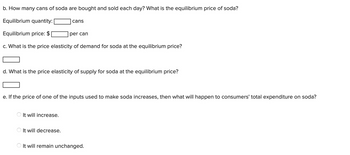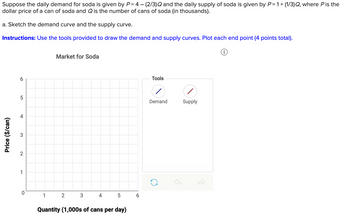
ENGR.ECONOMIC ANALYSIS
14th Edition
ISBN: 9780190931919
Author: NEWNAN
Publisher: Oxford University Press
expand_more
expand_more
format_list_bulleted
Question

Transcribed Image Text:b. How many cans of soda are bought and sold each day? What is the equilibrium price of soda?
Equilibrium quantity:
Equilibrium price: $
c. What is the price elasticity of demand for soda at the equilibrium price?
cans
d. What is the price elasticity of supply for soda at the equilibrium price?
It will increase.
per can
e. If the price of one of the inputs used to make soda increases, then what will happen to consumers' total expenditure on soda?
It will decrease.
It will remain unchanged.

Transcribed Image Text:Suppose the daily demand for soda is given by P=4-(2/3)Q and the daily supply of soda is given by P= 1+ (1/3)Q, where P is the
dollar price of a can of soda and Q is the number of cans of soda (in thousands).
a. Sketch the demand curve and the supply curve.
Instructions: Use the tools provided to draw the demand and supply curves. Plot each end point (4 points total).
Ⓡ
Price ($/can)
6
LO
5
+
3
2
1
0
Market for Soda
1 2 3
4 5 6
Quantity (1,000s of cans per day)
Tools
/
Demand
/
Supply
Expert Solution
This question has been solved!
Explore an expertly crafted, step-by-step solution for a thorough understanding of key concepts.
Step by stepSolved in 5 steps with 3 images

Knowledge Booster
Learn more about
Need a deep-dive on the concept behind this application? Look no further. Learn more about this topic, economics and related others by exploring similar questions and additional content below.Similar questions
- Oatmeal is an inferior good and cold cereal is a substitute for oatmeal. The cross‐price elasticity of Raisin with respect to oatmeal is negative. Using a well‐labeled graph show the effect on the oatmeal market for each of the following. (Please also provide a brief explanation of the relationship (e.g., positive/negative) and the reasons/logic for the relationship. a. An increase in the price of raisins. b. An increase in income. c. A decrease in population size. d. An increase in the price of cold cerealarrow_forwardAnswer the question, using the 3 step approach 4. Explain the cross-price elasticity of demand of I0GO yoghurt when the price of Yop yoghurt reduces?arrow_forwardcarefully answer itarrow_forward
- E3arrow_forwardExhitbit SD.2 DI D2 |Quantity Refer to the above Supply-Demand diagram. One of the following factors causes the shift from S1 to S2, O the demand for low-fat meals has risen. O consumer income may have risen. O the quantity of resources used in the production of low-fat mcals has risen. demand for popular hcalthy foods increased. Price E.arrow_forward
arrow_back_ios
arrow_forward_ios
Recommended textbooks for you

 Principles of Economics (12th Edition)EconomicsISBN:9780134078779Author:Karl E. Case, Ray C. Fair, Sharon E. OsterPublisher:PEARSON
Principles of Economics (12th Edition)EconomicsISBN:9780134078779Author:Karl E. Case, Ray C. Fair, Sharon E. OsterPublisher:PEARSON Engineering Economy (17th Edition)EconomicsISBN:9780134870069Author:William G. Sullivan, Elin M. Wicks, C. Patrick KoellingPublisher:PEARSON
Engineering Economy (17th Edition)EconomicsISBN:9780134870069Author:William G. Sullivan, Elin M. Wicks, C. Patrick KoellingPublisher:PEARSON Principles of Economics (MindTap Course List)EconomicsISBN:9781305585126Author:N. Gregory MankiwPublisher:Cengage Learning
Principles of Economics (MindTap Course List)EconomicsISBN:9781305585126Author:N. Gregory MankiwPublisher:Cengage Learning Managerial Economics: A Problem Solving ApproachEconomicsISBN:9781337106665Author:Luke M. Froeb, Brian T. McCann, Michael R. Ward, Mike ShorPublisher:Cengage Learning
Managerial Economics: A Problem Solving ApproachEconomicsISBN:9781337106665Author:Luke M. Froeb, Brian T. McCann, Michael R. Ward, Mike ShorPublisher:Cengage Learning Managerial Economics & Business Strategy (Mcgraw-...EconomicsISBN:9781259290619Author:Michael Baye, Jeff PrincePublisher:McGraw-Hill Education
Managerial Economics & Business Strategy (Mcgraw-...EconomicsISBN:9781259290619Author:Michael Baye, Jeff PrincePublisher:McGraw-Hill Education


Principles of Economics (12th Edition)
Economics
ISBN:9780134078779
Author:Karl E. Case, Ray C. Fair, Sharon E. Oster
Publisher:PEARSON

Engineering Economy (17th Edition)
Economics
ISBN:9780134870069
Author:William G. Sullivan, Elin M. Wicks, C. Patrick Koelling
Publisher:PEARSON

Principles of Economics (MindTap Course List)
Economics
ISBN:9781305585126
Author:N. Gregory Mankiw
Publisher:Cengage Learning

Managerial Economics: A Problem Solving Approach
Economics
ISBN:9781337106665
Author:Luke M. Froeb, Brian T. McCann, Michael R. Ward, Mike Shor
Publisher:Cengage Learning

Managerial Economics & Business Strategy (Mcgraw-...
Economics
ISBN:9781259290619
Author:Michael Baye, Jeff Prince
Publisher:McGraw-Hill Education